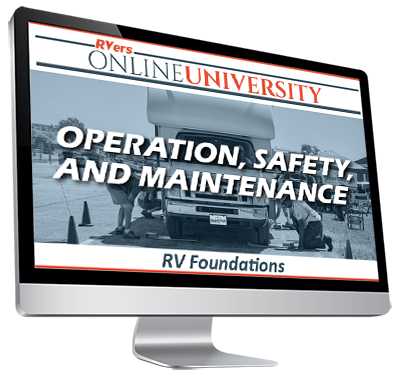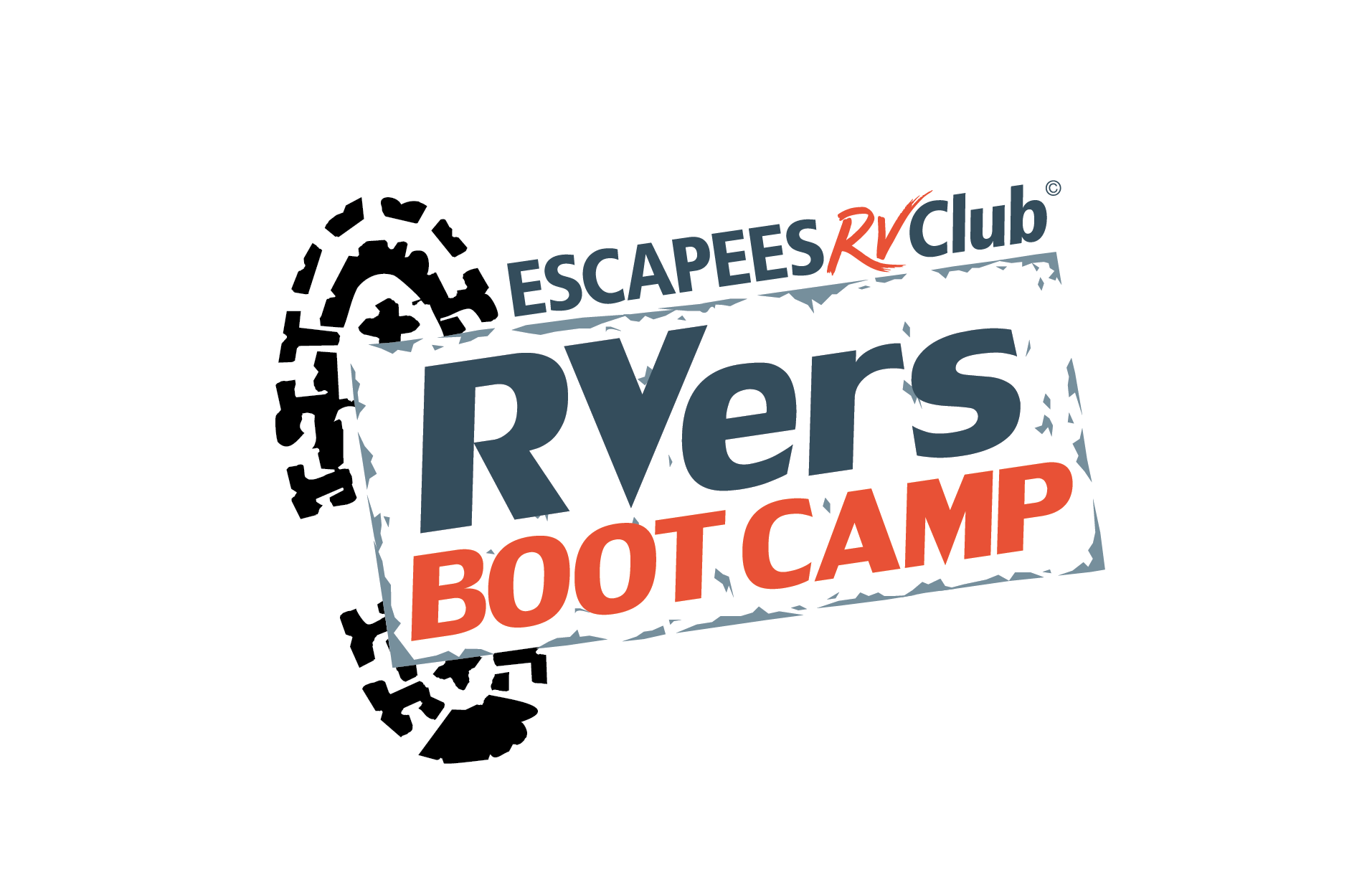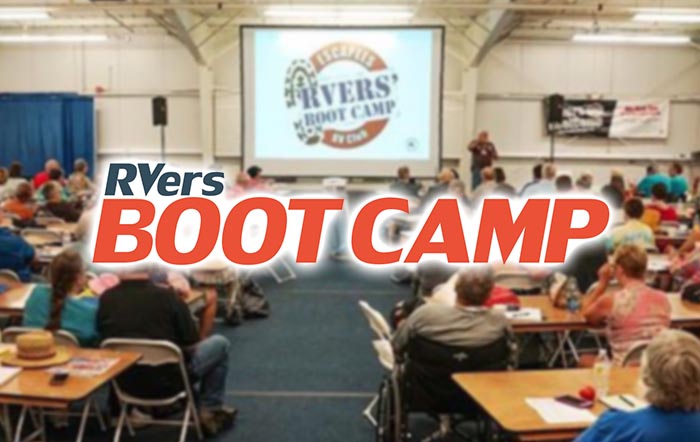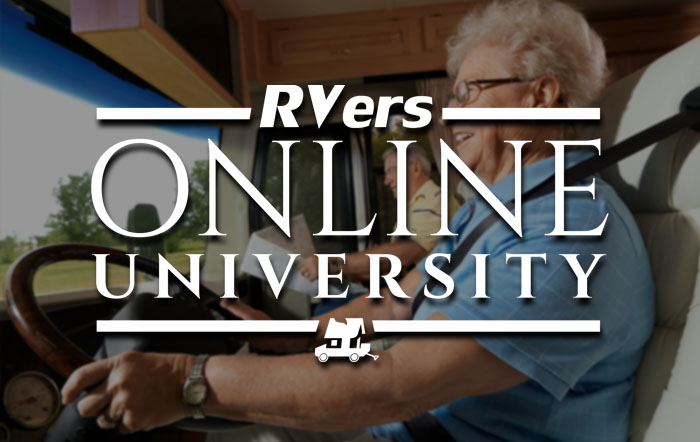You know you’ve earned your full-time RVing merit badge when you can consistently maintain a sense of humor when things go wrong. This lifestyle can look like one awesome, ongoing dream but even with several years and thousands of miles of full-timing under your belt, tough times happen. How you prepare for them will determine if you are cut out for a life on wheels.
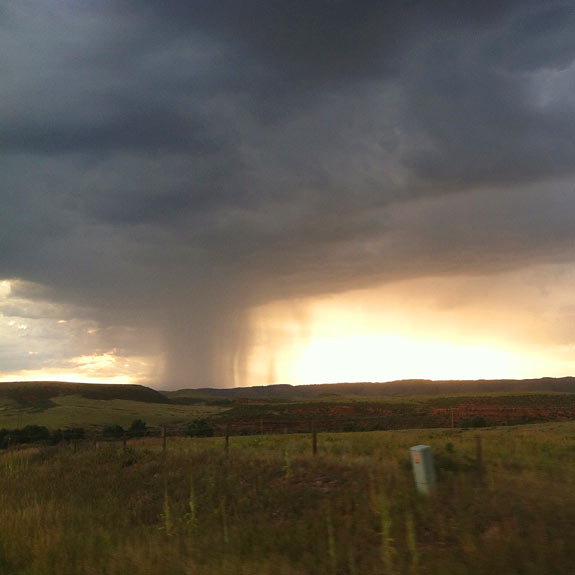
Missed it by That Much!
After eight years on the road, we finally earned our full-time RVing merit badge. We just returned from a long and eventful road trip to the West Coast for our new RVDatasat 840 satellite system and two big family gatherings. In preparation for the 3,500 mile jaunt we had our truck inspected at our favorite Fort Collins, Colorado auto shop – or so we thought it was inspected. . .
Rolling with the Full-time RVing Mishaps
The outbound trip was faster than we would have liked but everything went great and the Universe rewarded us with good times among friends and family. But on the return trip to Colorado, Mercury moved into retrograde and everything went to hell. The day we began our descent into the long stretch of barren I-80 asphalt between Truckee, California and Salt Lake City, the road tripping gods pummeled us with a slew of mishaps:
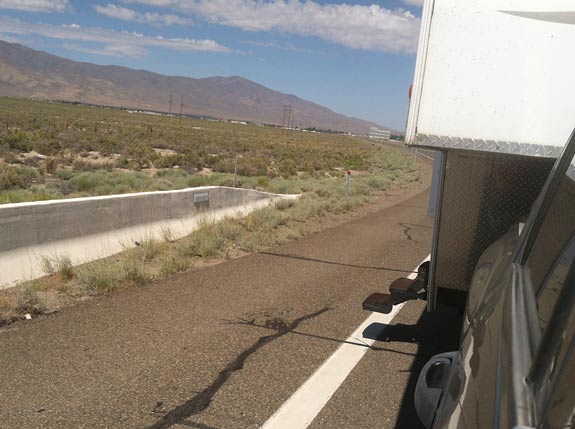
Yes, we left our RV stairs down.
- Mishap #1: Our truck bed toolbox lid flew open on the interstate. No biggie. It’s happened before because someone forgot to lock the lid.
- Mishap #2: We left a gas station and rolled onto the interstate with our trailer stairs down. Huh?! We’ve never been that absent minded.
- Mishap #3: After passing Carlin, Nevada, we felt a soft “thud” and looked out the rear view mirror to see something black flying away from us. About a minute later, we knew what it was: Our tire!
This is when preparing for full-time RVing travel pays off. With our new Coach-Net roadside emergency plan in place I was anxious to give it a whirl but Jim stubbornly insisted on changing the tire himself. Our Premiere Towable Plan has an unlimited number of service calls we can place, but he had a good reason for not using it: we would have waited a long time for a service truck to arrive on that empty stretch of hotter-than-hell asphalt.
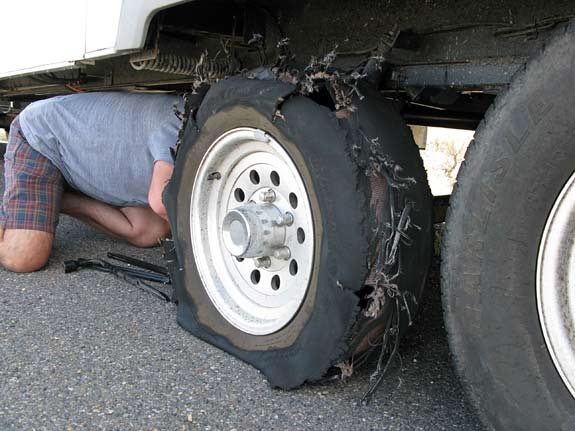
Oh, that’s what the thud was.
After putting on the spare and buying a new tire at a great shop in Elko, we rolled on. With a sigh of relief we beamed with pride knowing that we survived the ordeal without panicking.
- Mishap #4: The Big One. Murphy arrived.
Just outside of Salt Lake City we noticed the truck and trailer were really grimy. “Wow, that was some road!” we said to each other. Neither one of us thought to run our finger on the surface to see what it was, we were just too tired after a long day on the interstate.
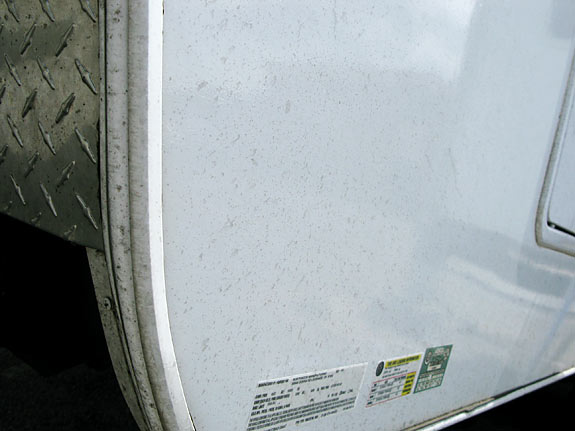
What’s that all over the rig?
At 6:00 am the next day while checking out of the RV park, things really hit the fan. Jim started the truck and within one minute, the “Check Gauges” light dinged. He flung open the hood, checked the engine oil and discovered – there wasn’t any! That grime covering our rig was our engine oil!
Instinctively Jim walked over to the neighboring truck stop to buy massive quantities of oil but by the time he returned I remembered; “Hey! We have our Coach-Net plan. We’re going to use it!” With a full Coach-Net roadside emergency plan in place, we would avoid driving the truck until we knew what was wrong.
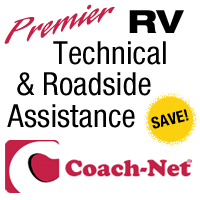 Getting to Know How Coach-Net Works
Getting to Know How Coach-Net Works
We dialed Coach-Net to use our plan and were greeted by customer service reps who truly wanted to help. As we worked with them to arrange a tow, here’s what we discovered about working with Coach-Net’s roadside emergency plan for RVs:
- Coach-Net gives you a free tow to the closest authorized service center that will do a same day check on your vehicle. Typically, you’ll head to a dealer. They might need to call three or four shops before finding one to help.
- If you know of a good mechanic but they’re not an authorized center, Coach-Net will do the tow but you will pay for the mileage difference between their shop and yours. It pays to get the cost-per-mile before choosing this option.
- Once Coach-Net pinpoints a shop, they’ll call you back to schedule the tow. However, if you have time on your side and are in a safe location, you might want to run a quick background check on the shop to ensure they have good feedback. We always scan Angie’s List and Yelp for providers.
- Be sure to ask the Coach-Net rep if the shop can get you to and from their location. The one Coach-Net selected had a great shuttle system in place but others may not.
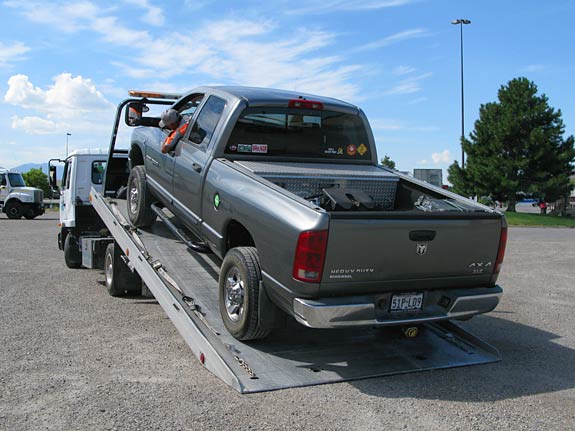
Not a pretty sight.
With the truck on a flatbed en route to Salt Lake City, I fretted over the possible scenarios. Had we blown up our engine? What could the problem be? Was it something that Fort Collins shop could have caught? In addition, the truck was going to a Dodge dealer and after being hosed by dealers in the past, we vowed to never use them again. I calmed my mind by telling myself that when you’re stuck between a rock and a hard place all bets are off.
Coach-Net Saves Our Rig and our Sanity
The next day the problem was revealed: a main engine seal on the rear crankshaft had blown, spewing oil all over our rig. The service manager indicated that the engine survived intact but that this kind of leak doesn’t happen overnight and was probably going on before we left Colorado.
This leads me full-circle back to the beginning of today’s story: we had paid our favorite Fort Collins auto shop for a pre-trip inspection and they missed the leak. For the second time in less than one year we left Fort Collins with vehicle issues after pre-trip inspections from these guys, so you can bet we won’t be returning to that shop.
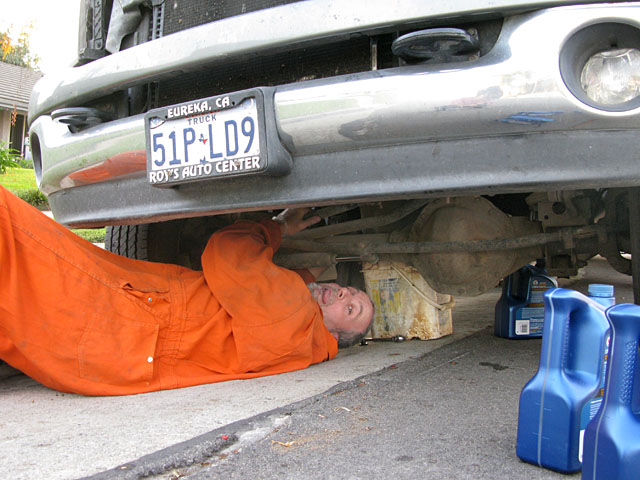
Taking the DIY approach.
If we didn’t have our Coach-Net plan, we would have put new oil in the truck and driven it to a shop. Had we done that, our engine would have seized up. Our Coach-Net plan saved our rig.
Two days later and with a $1600 repair bill in our hands, we were on our way. Looking back, I’m proud of the way we all handled this stressful situation. We could have fought and bickered, cried and yelled, barked and whined, but we didn’t. Eight years ago things wouldn’t have gone so well because when you’re a green full-time RVer you have a vision of what the full-time RVing lifestyle should look like – and it doesn’t include roadside emergencies and massive mechanical failures. Inevitably they happen and you either learn to cope or you park the RV and return to a traditional life.
It Pays to Prepare for RV Emergencies
Hard times are inevitable and usually happen at the worst possible time in the most unappealing location. The added stress of not knowing the shop you’re going to deal with, not having any friends around and the unfamiliarity of the area just adds to the stress. The good news is that you can deal with it by sticking to a disaster preparedness plan that includes:
- being debt-free
- building an adequate cash emergency fund
- maintaining good full-time RVing insurance for the rig and medical needs
- never traveling without an emergency roadside assistance plan with Coach-Net

Keep calm with a good full-time RVing plan.
Maintaining a disaster strategy like this takes discipline – we can all think of many other things we’d rather spend our money on. But for us, whenever a calamity has transpired we experienced far less stress because we had the resources to cope. Knowing that the monetary impact isn’t going to hit you as hard goes a long way toward helping you remain calm. With these key elements in place, any full-time RVer can handle whatever turns the road takes.
If you want to know more about Coach-Net, drop us a line, we’re happy to share more thoughts with you.
Check out Coach-Net Plan information but
join here to save $10 off your plan.


